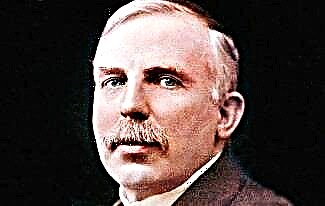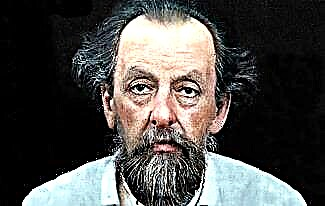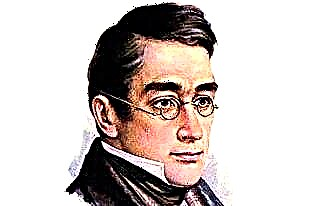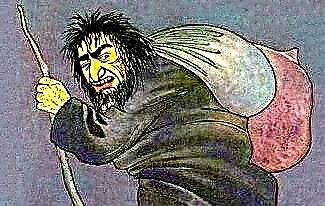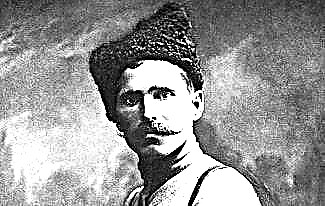"Eugene Onegin" - a novel in verse by the great Russian poet Alexander Pushkin, written in the period 1823-1830. One of the most outstanding works of Russian literature. The story is narrated on behalf of an unknown author who introduced himself as a good friend of Onegin.
In the novel, against the background of pictures of Russian life, the dramatic fate of the representatives of the Russian nobility of the early 19th century is demonstrated.

There are many interesting facts in the biography of Eugene Onegin, which we will talk about in this article.
So, before you is a short biography of Onegin.
The life of Eugene Onegin
Eugene Onegin is the hero of the novel of the same name in verse, the author of which is Alexander Pushkin. The character took the place of one of the brightest and most colorful types of Russian classical literature.
In his character, dramatic experiences, cynicism, and an ironic perception of the world around him are intertwined. Onegin's relationship with Tatiana Larina made it possible to understand the human essence of the hero, revealing his weak and strong sides.
Character creation history
Pushkin began writing the work during his exile in Chisinau. He decided to deviate from the traditions of romanticism, starting to create "Eugene Onegin" in the style of realism. The work describes the events that took place in the period 1819-1825.
An interesting fact is that the famous literary critic Vissarion Belinsky called the novel “an encyclopedia of Russian life”.

In a number of characters appearing in the work, the author skillfully presented people belonging to different social strata: nobility, landownership and peasantry, which were characteristic of the first quarter of the 19th century.
Alexander Pushkin conveyed the atmosphere of that era with unimaginable accuracy, and also paid great attention to everyday life.
Exploring "Eugene Onegin", the reader is able to find out virtually everything about the period of that time: how they dressed, what they were interested in, what they talked about and what people were striving for.
Creating his work, the poet wanted to present to society the image of a typical secular character, contemporary to himself. At the same time, Eugene Onegin is not alien to romantic heroes, "superfluous people", disillusioned with life, sad and prone to despondency.
It is curious that in the future the author wanted to make Onegin a supporter of the Decembrist movement, but for fear of censorship and possible persecution refrained from this idea. Each character trait was carefully thought out by Pushkin.
Literary critics find in the character of Eugene certain parallels with the traits of Alexander Chaadaev, Alexander Griboyedov and the author himself. Onegin was a kind of collective image of his time. Until now, there are heated discussions between literary critics as to whether the hero was an "alien" and "superfluous" person in the era, or was an idle thinker living for his own pleasure.
For the genre of poetic work, Pushkin chose a special stanza, which they began to call - "Onegin". In addition, the poet introduced lyrical digressions on various topics into the novel.
It would be wrong to say that the author of Eugene Onegin adhered to some basic idea in the novel - there are many of them, since the work touches on many issues.
The fate and image of Eugene Onegin
Onegin's biography begins with the fact that he was born in St. Petersburg, in not the best noble family. In childhood, the governess Madame was engaged in his upbringing, after which the French tutor became the boy's mentor, who did not overload the pupil with an abundance of classes.
Such education and upbringing received by Eugene was quite enough to appear in the world as a "smart and very nice" person. From an early age, the hero learned the "science of tender passion." The years of his further biography are full of love affairs and secular intrigues, which ultimately cease to interest him.

At the same time, Onegin is a young man who understands a lot about fashion. Pushkin describes him as an English dandy, in whose office there are "combs, steel files, straight scissors, curves and brushes of 30 kinds for both nails and teeth."
Making fun of Eugene's narcissism, the nameless narrator likens him to windy Venus. The guy enjoys an idle life, attending various balls, performances and other events.
Onegin's father, having accumulated a lot of debts, ultimately squanders his fortune. Therefore, a letter from a dying rich uncle inviting his nephew to the village comes in handy. This is due to the fact that the hero, then in a dull state, manages to try something new in life.
When his uncle dies, Eugene Onegin becomes the heir to his estate. Initially, he is interested in living in the village, but on the third day the local life begins to bore him. Soon he meets his neighbor Vladimir Lensky, a romantic poet who recently arrived from Germany.
Although young people are complete opposites of each other, friendships develop between them. However, after some time, Onegin becomes bored and in the company of Lensky, whose speeches and views seem ridiculous to him.
In one of the conversations, Vladimir admitted to Eugene that he was in love with Olga Larina, as a result of which he invited his friend to go with him to visit Larin. And although Onegin did not count on an exciting conversation with members of the village family, he nevertheless agreed to go with Lensky.
During the visit, it turns out that Olga has an older sister, Tatiana. Both sisters evoke conflicting feelings in Eugene Onegin. Returning home, he tells Vladimir that he is surprised why he liked Olga. He adds that besides her attractive appearance, the girl has no other virtues.

In turn, Tatyana Larina aroused interest in Onegin, since she did not look like the girls with whom he had to communicate in the world. It is worth noting that Tatiana fell in love with Eugene at first sight.
The girl writes a frank letter to her lover, but the guy does not reciprocate her. A measured family life is alien to Onegin, about which he speaks in front of everyone during the second trip to the Larins to her sister Olga.
In addition, the nobleman recommends Tatiana to learn to control herself, because a dishonest person could be in his place: "Not every one of you, as I understand, leads to misfortune".
After that, Evgeny no longer comes to the Larins. Meanwhile, Tatyana's birthday was approaching. On the eve of the name day, she dreamed of a bear that caught up with her in the forest. The beast carried her home, leaving her at the door.
Meanwhile, a feast of evil is taking place in the house, where Onegin himself sits in the center of the table. Tatiana's presence becomes apparent to the merry guests - each of them dreams of taking possession of the girl. Suddenly, all the evil spirits disappear - Eugene himself leads Larina to the bench.
At this moment, Vladimir and Olga enter the room, which makes Onegin angry. He takes out a knife and stabs Lensky with it. Tatiana's dream becomes prophetic - her birthday is marked by sad events.
Various landowners come to visit the Larins, as well as Lensky and Onegin. The wedding of Vladimir and Olga should take place soon, as a result of which the groom cannot wait for this event. Eugene, seeing Tatiana's quivering looks, loses his temper and decides to entertain himself by flirting with Olga.
In Lenskoye, this causes jealousy and indignation, as a result of which he challenges Eugene to a duel. Onegin kills Vladimir and decides to leave the village. Pushkin writes that at that time in his biography, the "English dandy" was 26 years old.
After 3 years, Eugene Onegin visits St. Petersburg, where he meets the already married Tatyana. She is the wife of the general, representing a sophisticated socialite. Unexpectedly for himself, the guy realizes that he is in love with a girl.

Events are repeated in a mirror-like manner - Onegin writes a letter to Tatyana, in which he confesses his feelings. The girl does not hide the fact that, as before, she loves him, but is not going to cheat on her husband. She writes: "I love you (why dissemble?), But I am given to another and will be faithful to him forever."
This is where the piece ends. Pushkin leaves the discouraged Eugene and says goodbye to the reader in several remarks.
Eugene Onegin in culture
This novel has repeatedly become an inspiration for various artists. In 1878 Pyotr Tchaikovsky created the opera of the same name, which became one of the most famous in the world. Sergei Prokofiev and Rodion Shchedrin composed music for performances based on Eugene Onegin.
"Eugene Onegin" was filmed several times on the big screen. The one-man show, where the key role went to Dmitry Dyuzhev, became quite famous. The actor read excerpts from the novel, which were accompanied by a symphony orchestra.
The work in the format of a confidential conversation with the audience was translated into 19 languages.
Onegin Photos



Onegin's illustrations
Below are some of the most famous illustrations for the novel "Eugene Onegin", created by the artist Elena Petrovna Samokish-Sudkovskaya (1863-1924).








